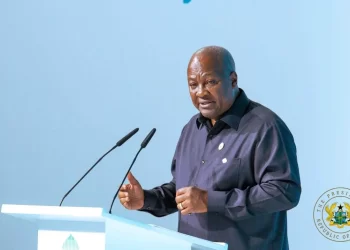The newly established Ghana Gold Board (GoldBod) previously PMMC has recorded a historic breakthrough in gold exports, purchasing and exporting 11 tonnes of artisanal small-scale (ASM) gold valued at an astonishing $1.172 billion in May 2025 alone.
From February to May 2025, Precious Minerals Marketing Company (PMMC), now GoldBod, exported ASM gold worth over GH₵40 billion (approximately $4 billion), overtaking exports from Ghana’s large-scale gold mining sector for the first time in the country’s history.
Total ASM gold exports through GoldBod from January to May reached a remarkable 41.5 tonnes.
This achievement reflects a broader transformation of Ghana’s once-disjointed gold trading system and marks a significant milestone in the fight against illegal gold smuggling.
GoldBod’s Chief Executive Officer (CEO), Sammy Gyamfi, disclosed these figures at the Mining In Motion Summit in Accra, underscoring the agency’s sweeping impact in just a few months of operations.
Turning a bleeding sector around
Ghana, Africa’s top gold producer and a key player in the global extractive sector, has historically struggled to harness its mineral wealth for national prosperity.
Despite its rich gold endowment, poor regulation, fragmented oversight, and widespread smuggling have crippled earnings from the ASM sector for years.
The result was lost revenues, forex shortages, and disempowered local economies.
“For many years, Ghana’s poorly-regulated gold trading sector denied the country from reaping the full benefits of its rich gold resource,” Gyamfi noted, describing the paradox of a “butcher starved of protein.”
The tide, however, is turning, thanks to the vision of President John Dramani Mahama, who initiated the establishment of GoldBod as the central state authority to regulate, purchase, assay, refine, and export gold—especially from the artisanal and small-scale mining sector.
Centralized oversight, market confidence
With broad stakeholder consultations and a clear legal mandate, GoldBod has absorbed the rights and responsibilities of the former PMMC, streamlining Ghana’s gold trade into a coherent, regulated framework.
GoldBod is now the sole buyer and exporter of ASM gold in Ghana and may also buy from large-scale producers under the state’s preemption rights.
It has swiftly implemented aggressive regulatory and aggregation measures, mopping up over 90% of all ASM gold.
These reforms, Gyamfi said, have contributed not only to record export volumes but also to growing confidence in Ghana’s monetary outlook.
“This, coupled with prudent monetary and fiscal policies, has significantly increased forex liquidity… leading to the sustained appreciation of the national currency,” he stated.
Licensing, due diligence, and responsible sourcing
To deepen reforms, GoldBod has begun licensing all gold trading actors under strict codes of conduct aligned with anti-money laundering and combating the financing of terrorism (AML/CFT) protocols.
Categories include aggregation, buying, refining, smelting, transport, and export partnerships.
Foreigners are barred from direct gold purchases in the local market but may engage through partnerships or apply for licenses to establish refineries or jewellery manufacturing ventures.
Gyamfi invited the global investor community to explore opportunities in Ghana’s responsible gold ecosystem.
Traceability, sustainability, and social impact
Looking ahead, he said GoldBod plans to deploy a digital supply chain traceability system before year’s end.
According to him, by 2026, the agency will establish an international-standard assay laboratory to certify the purity and valuation of all gold exported from Ghana.
Gyamfi explained that September 2025 would witness the start of nationwide training for artisanal miners in environmentally friendly and efficient extraction techniques.
Additionally, he said GoldBod would co-invest in the Ministry of Lands and Natural Resources’ cooperative mining programme and partner with various mining scales to maximise output.
He announced that GoldBod is also committing substantial portions of its trade surplus to land reclamation, environmental sustainability, and social responsibility projects—including health, education, and clean water infrastructure in mining communities.
Crackdown on smuggling, boost for local industry
To stamp out illegal gold trading, he announced that GoldBod would soon launch an anti-smuggling taskforce in partnership with the National Security Secretariat.
“The days of illegal gold trading and uncontrolled gold smuggling have come to an end… We shall not rest until every gold smuggler is put behind bars,” Gyamfi declared.
He noted that the agency is also taking steps to transition Ghana from exporting semi-processed dore gold to fully refined bullion, working with local refineries to attain London Bullion Market Association (LBMA) accreditation.
Gold village vision and final call to action
As part of a broader value-addition drive, Gyamfi said GoldBod is inviting partners to help realise President Mahama’s vision of a “Gold Village” in Ghana—an industrial hub for gold jewellery and ornaments that can position the country as a leader in Africa’s precious metals value chain.
“Ghana is ready. The GoldBod is prepared. And together, we can all sail to higher realms of dividends in the mining sector where the environment is preserved, lives are bettered, and communities are uplifted,” Gyamfi stated.












